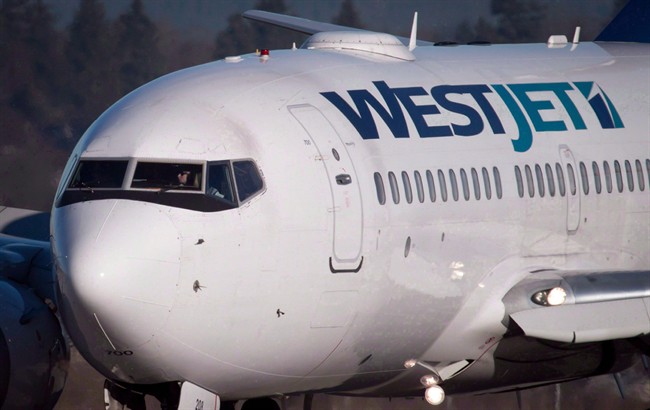VANCOUVER – WestJet is rejecting allegations made by a former flight attendant that it fails to provide a harassment-free workplace for its female employees, saying it would not put its reputation at stake by inadequately dealing with complaints.

The Calgary-based airline’s response to a civil claim, filed this week in British Columbia Supreme Court, argues against granting class-action status to a lawsuit launched earlier this month by Mandalena Lewis.
READ MORE: 2 WestJet employees off flying duty in wake of sex-assault allegation
“WestJet denies allowing harassment to exist in its workplace,” the court document says. “There are clear financial and reputational incentives for WestJet to provide a harassment-free workplace to all employees.”
This is the second lawsuit Lewis has filed against WestJet. Earlier this year she filed a civil claim alleging WestJet failed to take proper action after she reported being sexually assaulted by a pilot while on a stopover in Hawaii.
She has said she began the proposed class action when multiple women approached her with similar complaints after she filed her initial lawsuit.
Behaviours mentioned in the latest notice of claim include sexist jokes, obscene comments, unwelcome physical contact and “midnight knocking,” which Lewis defines as a request or demand for late-night sexual favours by pilots while on a stopover.

Get breaking National news
READ MORE: Ex-WestJet employee shocked at positive response
The claim accused the company of protecting “harassers,” often pilots, who are considered more economically valuable employees.
Lewis has said she is unsure how many people could be involved if the lawsuit receives class-action certification. Flight attendants make up about a quarter of the more than 11,000 workers WestJet employs.
None of the allegations have been proven in court.
In its response to the latest legal action, the airline argues against class-action approval because it says the circumstances for any given potential plaintiff aren’t universal enough to consider them as a group.
WestJet denies allegations that the way it investigates reports of harassment discourages victims from coming forward with complaints and attempts to silences them when they do.
READ MORE: WestJet hires firm to investigate workplace assault allegations
“In fact, the opposite is true,” the airline says, rejecting the claim that its approach leads to the under-reporting of harassment.
“WestJet’s (confidential) investigation process encourages WestJetters to report inappropriate behaviour by allowing them to do so in confidence.”
The airline says privacy laws prevent it from disclosing the particulars of an investigation.
WestJet also took aim at Lewis’s eight-year work record, highlighting the circumstances that led to her firing in January.
“From the beginning of her employment, Lewis had consistently poor attendance,” it says, describing the eight instances she was formally disciplined.
The company says it ended Lewis’s contract after she sent a manager an email containing a profanity demanding her employment file, which the company was late in providing.
“Lewis’s grossly insubordinate and insolent email, combined with Lewis’s extensive disciplinary record, warranted the termination of Lewis’s employment for just cause.”
In its response to the original lawsuit, WestJet also says its decision to fire Lewis was the result of her attendance, inappropriate use of social media and aggressive communication style.
Lewis couldn’t be reached for comment Wednesday, but in a previous interview has dismissed the allegations as a red herring meant to distract from the core issue of flight-attendant safety.











Comments